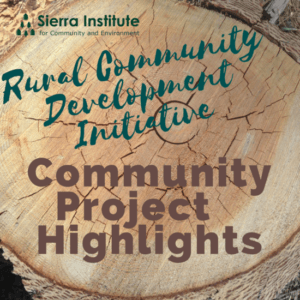 This is the second installment of this month’s series on the Rural Community Development Initiative.
This is the second installment of this month’s series on the Rural Community Development Initiative.
Camptonville Community Partnership has been serving the community of Camptonville since 1996. For nearly 20 years, its programs remained focused on youth and family development and providing space for the community to grow and connect. Camptonville Community Partnership (CCP) sponsors the Camptonville Courier, a free volunteer led newspaper, and runs 1,2,3 Grow, an early childhood enrichment program. Their scope of work expanded when, in 2013, they entered the complicated world of small scale bioenergy.
This move may seem like a bit of a left turn, but as CCP realized, it’s really not. The proposed project, a 3 megawatt bioenergy facility that sells electricity and heats co-located businesses, would provide welcome employment opportunities in a rural area where there aren’t many. With similar socioeconomic conditions in both our locations, this is where Sierra Institute comes into the picture. Through RCDI and direct legal and technical assistance provided by Sierra Institute, CCP are advancing their vision for community scale wood utilization.
The health benefits of this project were of particular interest to CCP. Reducing the risk of wildfire would limit smoke exposure that threatens the community, particularly the sick and elderly. It’s not just wildfires that pose a threat to air quality in the region- pile burns also put a lot of smoke in the air. Because it is so expensive to remove, low value restoration byproducts (branches and small trees that are thinned to make the forest more resilient to wildfire) are often piled and burned in the forest. A bioenergy facility would offer a solution, providing an outlet for this material, where it can be processed cleanly while creating other benefits, like energy.
Camptonville Community Partnership plans to convert an old mill site into a Forest Biomass Business Center (FBBC), a small industrial campus that will house a bioenergy system and offer space for other local wood businesses, such as firewood or pole production. The heat generated from the facility could also warm a greenhouse or brewery on site. CCP is still in the development phase of this project, but they’ve made a lot of progress, and they’ve benefitted from a strategy of taking it slow and learning while they go. As community scale bioenergy and wood utilization projects by Sierra Institute and RCDI partners advance, we’ll keep you in the loop with lessons learned and long term successes.


